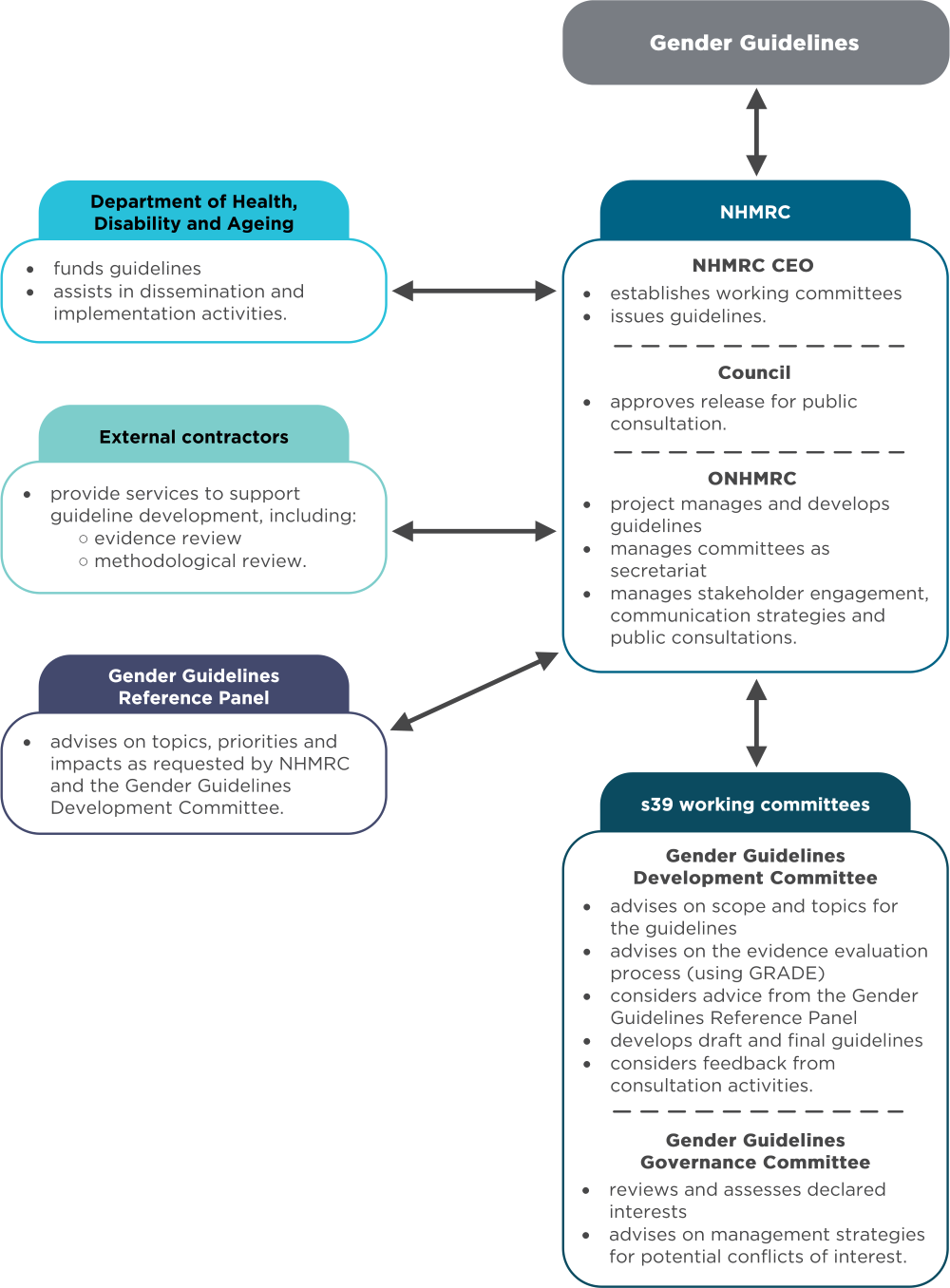NHMRC has established a Governance Committee and a Guideline Development Committee to advise on the development of the clinical practice guidelines for the care of trans and gender diverse people under 18 with gender dysphoria (Gender Guidelines).
NHMRC’s legislative requirements
As a legislative function of the National Health and Medical Research Council Act 1992 (Cth) (NHMRC Act), NHMRC is tasked with inquiring into, issuing guidelines and advising the community on matters related to individual and public health. This legislative function underpins NHMRC’s authority and responsibility in developing clinical practice guidelines.
NHMRC guidelines are developed by expert advisory committees established under section 39 of the NHMRC Act. Members are appointed for their expertise and experience across diverse professions and fields, with consideration given to balancing expertise against the risk of bias. NHMRC Standards for Guidelines requires guideline development groups to include those most likely to be affected by the guideline, such as consumers, clinicians, and researchers.
Appointed members of guideline development committees are legally required to disclose details of interests related to the scope of the guidelines and NHMRC activities. Members will be provided with a list of disclosed interests at each meeting and will be asked to consider if any interest could affect their capacity to bring an independent mind to bear on the matters being considered by the committee.
Committees and advisory groups
NHMRC has established 2 section 39 committees under the NHMRC Act to provide expert advice throughout the guideline development process.
The Gender Guidelines Governance Committee was established to provide advice on the composition of the Gender Guidelines Development Committee, including reviewing disclosure of interest declarations of prospective members, and to advise NHMRC on approaches if governance issues arise during the guideline development process. The Gender Guidelines Governance Committee includes 4 experts in bioethics, health law, and systematic reviews.
The Gender Guidelines Development Committee was established to develop clinical practice guidelines for the care of trans and gender diverse people under 18 with gender dysphoria. The Gender Guidelines Development Committee will:
- advise on scope and topics for the guidelines
- advise on the evidence review process
- develop draft and final guidelines
- consider feedback from consultation activities.
The Committee comprises 18 members, including clinicians, researchers, and 4 individuals with lived experience of accessing gender services in Australia, either personally (including those who are trans and gender diverse) or as someone caring for a person who has.
NHMRC has also established a Gender Guidelines Reference Panel to provide a diversity of perspectives on topics and priorities relevant to the end users of the guideline. The Gender Guidelines Reference Panel is not a committee and will not have decision making authority in relation to the guidelines. Participants will be consulted as needed throughout the project. The Reference Panel will include young people who have accessed gender services in Australia, parents, caregivers, and clinicians who provide care to trans and gender diverse young people. This will help ensure the guidelines are relevant and meaningful for young people seeking care, their families, and the clinicians providing that care.
NHMRC will be responsible for the performance and conduct of all NHMRC staff, including committee members.
Governance structure
The governance structure for the Gender Guidelines is outlined in the diagram below, including roles and responsibilities.

Abbreviations: GRADE, Grading of Recommendations Assessment Development and Evaluation; NHMRC, National Health and Medical Research Council; ONHMRC, Office of the National Health and Medical Research Council; s39, Section 39.
- Image description: Gender Guidelines Governance Structure
Department of Health, Disability and Ageing engages with NHMRC to:
- funds guidelines
- assists in dissemination and implementation activities.
External contractors engage with NHMRC to:
- provide services to support guideline development, including:
- evidence review
- methodological review.
The Gender Guidelines Reference Panel will engage with NHMRC to:
- advise on topics, priorities and impacts as requested by NHMRC and the Gender Guidelines Development Committee.
Section 39 working committees
The Gender Guidelines Reference Panel will engage with NHMRC to:
- review and assess declared interests
- advise on management strategies for potential conflicts of interest.
The Gender Guidelines Governance Committee engages with NHMRC to:
- advise on scope and topics for the guidelines
- advise on the evidence evaluation process (using GRADE)
- consider advice from the Gender Guidelines Reference Panel
- develop draft and final guidelines
- consider feedback from consultation activities.
In addition to engaging with the Department, external contractors, the Gender Guidelines Reference Panel and working committees, NHMRC will carry out responsibilities through:
The NHMRC CEO, who will:
- establish working committees
- issue guidelines.
Council, who will:
- approve the release of draft guidelines for public consultation.
Office of the NHMRC (ONHMRC), who will:
- project manage and develop guidelines
- manage committees as secretariat
- manage stakeholder engagement, communication strategies and public consultations.